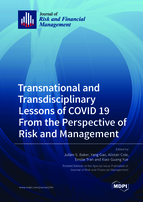Transnational and Transdisciplinary Lessons of COVID 19 From the Perspective of Risk and Management
A special issue of Journal of Risk and Financial Management (ISSN 1911-8074). This special issue belongs to the section "Risk".
Deadline for manuscript submissions: closed (30 November 2021) | Viewed by 46207
Special Issue Editors
Interests: health behaviors; medical and health sciences; applied physiology; exercise and immune function; hormonal control and exercise applied physiology; exercise biochemistry; cardiovascular disease; obesity and related co-morbidities; biomechanics
Special Issues, Collections and Topics in MDPI journals
2. Department of Sport, Physical Education and Health, Hong Kong Baptist University, Kowloon Tong, Hong Kong Special Administrative Region, China
Interests: health promotion; disease prevention; disease rehabilitation; exercise sciences
Interests: european and comparative politics; public administration; public policy
Special Issues, Collections and Topics in MDPI journals
Interests: China; Chine-Europe relations; diasporas
Special Issue Information
Dear Colleagues,
Rarely has scientific research been as solicited as in the past few months, as societies struggle to cope with the coronavirus. The questions raised by COVID-19 are germane to the medical and the social sciences. From an International Relations perspective, COVID-19 gets to the heart of what comprises a common good—the global commons. From a public policy perspective, COVID-19 is the wicked policy problem par excellence, requiring inter-agency collaboration. From a social science perspective, COVID-19 provides a vast living dataset to engage in multilevel comparisons and real-time experiments. In the medical research field, the pandemic has provided advancements in medical science that would not have been possible without access to a living laboratory. The huge advances in medical science have themselves been filtered by societal variables such as trust and transparency, or risk and resilience. Responding to existential dilemmas, the COVID-19 pandemic calls for a major transdisciplinary research effort that necessarily combines several levels of empirical analysis and methodological tools and bridges distinct academic and scientific traditions. The Special issue will engage in a transnational and transdisciplinary exercise in reflexivity, consisting of a mix of research articles, review articles as well as short communications which address one or more of the cutting-edge issues at the transdisciplinary and/or transnational intersection on the COVID-19 pandemic:
- COVID-19 from the perspective of risk and management
- Economic and financial consequences of COVID-19
- Psychological, medical, and environmental markers of COVID-19
- Trust and transparency as governance tools for COVID-19
- Risk and resilience as coping strategies for COVID-19
- Crisis management and governance
- Global perspectives and experience on governance and societies in the pandemic
- Public opinion and COVID-19
- (Social) media communication strategies
- Big data, smart apps, and the pandemic
- The world after COVID-19
Prof. Dr. Julien S. Baker
Dr. Yang Gao
Prof. Dr. Alistair Cole
Dr. Emilie Tran
Prof. Dr. Xiao-Guang Yue
Guest Editors
Manuscript Submission Information
Manuscripts should be submitted online at www.mdpi.com by registering and logging in to this website. Once you are registered, click here to go to the submission form. Manuscripts can be submitted until the deadline. All submissions that pass pre-check are peer-reviewed. Accepted papers will be published continuously in the journal (as soon as accepted) and will be listed together on the special issue website. Research articles, review articles as well as short communications are invited. For planned papers, a title and short abstract (about 100 words) can be sent to the Editorial Office for announcement on this website.
Submitted manuscripts should not have been published previously, nor be under consideration for publication elsewhere (except conference proceedings papers). All manuscripts are thoroughly refereed through a single-blind peer-review process. A guide for authors and other relevant information for submission of manuscripts is available on the Instructions for Authors page. Journal of Risk and Financial Management is an international peer-reviewed open access monthly journal published by MDPI.
Please visit the Instructions for Authors page before submitting a manuscript. The Article Processing Charge (APC) for publication in this open access journal is 1400 CHF (Swiss Francs). Submitted papers should be well formatted and use good English. Authors may use MDPI's English editing service prior to publication or during author revisions.







